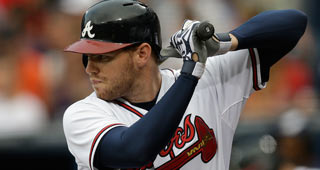The Atlanta Braves made an uncharacteristic move on Tuesday, signing Freddie Freeman to an eight-year contract extension that could be worth as much as $135 million.
Freeman, who won't turn 25 until September, receives the biggest contract in franchise history. That is surprising given the star power the Braves have enjoyed over the last few decades, but contracts for young players have entered a new realm in recent winters.
It is more noteworthy that Freeman is now signed through 2021 at an average annual value of close to $17 million, while Jason Heyward avoided arbitration with just a two-year, $13.3 million pact.
As Matt Snyder of CBS Sports points out, the agreement is a clear indication that the Braves are hitching their wagon to Freeman for the foreseeable future.
Freeman, an All-Star for the first time this past July, hit .319/.396/.501 with 23 home runs and 109 RBIs in 629 plate appearances in 2013. It was his third full Major League season and far-and-away his best. The first baseman had a disappointing slash line -- .259/.340/.456 -- just two seasons ago.
Frank Wren believes he'll receive a handful of MVP-caliber seasons from Freeman, who finished fifth in the voting for the National League honor this fall. I'm not entirely sold on Freeman replicating those numbers over the next seven or eight seasons.
Freeman had a career-high .371 batting average on balls in play when he hit .319 this past season. He had a .295 BAbip in 2012, which explains the lower batting average. The typical BAbip is close to .300, so Freeman was either very lucky in 2013 or he made a significant jump in effectiveness at the plate.
Most of Freeman's batting ratios remained level from 2012 to 2013, which leads me to believe that he may end up closer to what we saw two seasons ago than anything else. He homered once every 24 at-bats in 2013, down ever so slightly from one per 23.5 ABs the season before. He struck out a little less often (19.2% strikeout rate down from 20.8%) and walked a little more often (10.5% up from 10.3% in 2012).
Freeman's jump in BAbip also explains why he was so good with runners in scoring position. Only Allen Craig (.454) had a higher batting average with RISP than Freeman (.443), while his OPS (1.236) in those situations was second to just Miguel Cabrera (1.311)
He ranked 10th among NL position players with 5.5 WAR in 2013, a rate that most statistical sites rates as just above All-Star level. Paul Goldschmidt (7.1) and Joey Votto (6.4) were the only first baseman higher on the list.
Freeman isn't simply asked to hit by Fredi Gonzalez. He committed just 10 errors at first last season, the fourth-lowest total in the NL. His fielding percentage (.996) ranked fifth as he provides solid defense for the Braves.
Grade for Freeman: A
This deal was a no-brainer for Freeman, who turned one season of All-Star production into a superstar-sized long-term contract. He will be just 32 when this deal expires in 2021, leaving open the possibility of another sizeable contract if he lives up to the expectations that will come with this one.
Atlanta is also expected to contend in the NL East over the short term. They ran away with the division last season thanks to down years from the Washington Nationals and Philadelphia Phillies and have a farm system with a handful of prospects prepared to help at the Major League level this coming season.
Grade for the Braves: C
The contract will be a good, not great, value for the Braves if Freeman puts together a run of five or six seasons that are comparable to his most recent numbers. However, without a strong history at that level, that is far from a guarantee. Without a window into the negotiations it's hard to determine what was discussed, but Freeman did have three more years of arbitration left before he would have been able to hit the free agent market.
Heyward has enjoyed two very good years out of four Major League seasons, with the other two campaigns marred by injury and inconsistency. Freeman has more value if he maintains an All-Star level of play, but doesn't come with much more consistency than the 24-year-old outfielder.
The Braves, who had a middling payroll last season, are putting themselves on the line for Freeman. They could have given themselves another year to evaluate before spending $135 million, but opted to preemptively lock up their first baseman.



